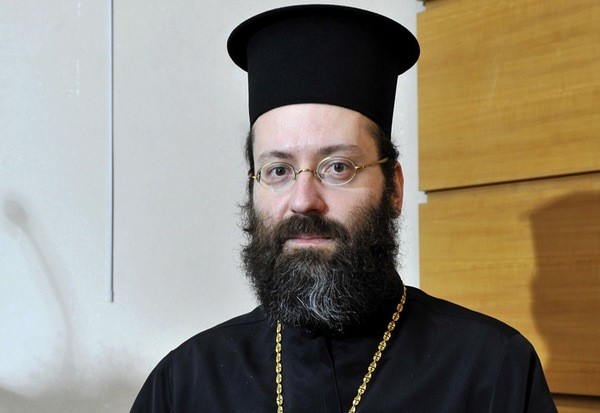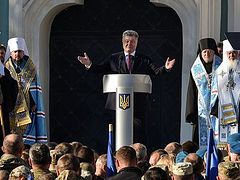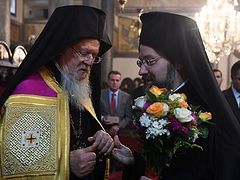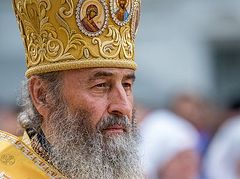Kiev, November 10, 2018
The heads of the schismatic “Kiev Patriarchate” (KP) and the schismatic “Ukrainian Autocephalous Orthodox Church” (UAOC) have both written to Constantinople, acknowledging that they agree not to nominate themselves for the position of head of the new Ukrainian church that Constantinople is creating, a source in the UAOC reported to the Ukrainian site Vesti.
At the same time, in exchange for giving up his candidacy, Philaret Denisenko of the KP requests to be known as the “Honorary Patriarch.”
Denisenko began his career with the KP as officially the “Deputy Patriarch” to “Patriarch” Vladimir Romaniuk, though he was known to have been the true authority of the group, as Ukrainian journalist Vasily Anisimov has written.
Meanwhile, His Eminence Metropolitan Anthony of Boryspil and Bovary, the Chancellor of the canonical Ukrainian Church, stated several days ago in an interview with First Cossack that Denisenko and Maletich had received letters from Constantinople informing them that they could not participate in the elections for head of the new church.
A source in the UOAC close to the head confirmed to Vesti that its head, Makary Maletich, had sent a letter to Patriarch Bartholomew in Constantinople, noting that he would not be seeking the leadership position in the new church. He had earlier declared the same on Ukrainian television.
According to the UAOC source, Maletich emphasized that none of the bishops of the UAOC or KP have the proper authority or opportunities to quality for election as the head of the new church in Ukraine. Therefore, Maletich asked Pat. Bartholomew to appoint someone from among the bishops of the Ecumenical Patriarchate.
He also noted that the UAOC is aware that Philaret of the KP has written a similar letter, renouncing his candidacy, though he did ask that at the unification council he would be recognized as “Honorary Patriarch” and be given the position of head of the Holy Synod of the new church, and that the head of the new church would be the KP’s “Deputy Patriarch” “Metropolitan” Epiphany.
Epiphany is a student and protégé of Philaret. “In the event of his election, Philaret maintains his influence, repeating the situation of the early 90s, when Patriarch Vladimir Romaniuk was the head of the breakaway UOC-KP, but in fact the church was ruled by Philaret,” explained religious scholar Alexei Smirnov.
Philaret also requests that the resultant document from the unification council recognizes “his personal important role in the process of creating an autocephalous church in Ukraine.” The UAOC source believes that Philaret is hoping to thereby secure his status as the main moral authority in the new church and to out-maneuver Constantinople, establishing his personal control over all the important administrative structures of the new church.
Philaret reportedly signed his letter as “Archbishop” and Makary his as “former Metropolitan.”
The UAOC source further stated that the upcoming council may not be “unifying” but “constitutive,” with a Constantinople hierarch taking the head position. Furthermore, he specifically identified Archbishop Job (Getcha) of Telmessos as the future head.
Moreover, the bishops of the new church will be subordinated to Constantinople, having only to confirm by their vote the decisions already made there. The new church will not have the status of a patriarchate, and even after receiving its tomos of autocephaly it will still be subordinate to Constantinople in several important matters, such as the confirmation of its leadership, the distribution of church funds, the canonization of new saints, and so on.
Recall that the aforementioned Job (Getcha) recently declared that all bishops of all churches in Ukraine are now bishops of the Patriarchate of Constantinople, in the eyes of Constantinople.
If the UAOC source is correct, the new “autocephalous” church will have less freedom than the canonical Ukrainian Church currently has as an autonomous Church within the Moscow Patriarchate.
The source commented that Getcha’s candidacy is dubious, recalling that his stint as the bishop of the Western European Exarchate of the Patriarchate of Constantinople was fraught with conflicts between himself and his clergy and the St. Sergius Institute in Paris, which therefore temporarily suspended activities in 2015. Getcha was soon released from his position as Western European hierarch, having been accused of an authoritarian style of leadership and of seeking to destroy the cherished traditions in the Exarchate.
For his part, Alexei Smirnov believes the candidates will be Job (Getcha) and Exarch Daniel (Zelinsky)—not someone from within Ukraine so that Constantinople can maintain control even after the granting of a tomos of autocephaly. And in agreement with the UAOC source, he adds: “If Constantinople grants a tomos to the church, there is likely to be spelled out a special role for Constantinople—it will be addressed as a court of higher instance, and, moreover, the church will receive Chrism from there.”
The same names were also mentioned by Archpriest Vsevolod Chaplin, the former head of the Russian Church’s Synodal Department for the Cooperation of Church and Society, on his Telegram Channel, though he writes that Exarch Daniel is the most likely candidate.
The right of a Church to make its own Chrism is one of the fundamental external signs of autocephaly, though Constantinople requires newly-created Churches to receive Chrism from it, thus keeping them in a subordinate role, Smirnov explained.
The tomos of autocephaly given to the Church of the Czech Lands and Slovakia in 1998 can serve as an example of what Smirnov says.
The Church first received autocephaly from the Moscow Patriarchate, in whose jurisdiction it was, in 1951. That tomos reads in full:
The Russian Orthodox Church, in the person of Alexei of Moscow and All Russia, and the entire sacred Bishops’ Council, in consideration of the petition of the Church Council of the Orthodox Church in Czechoslovakia, grants this Church, heretofore an Exarchate of the Moscow Patriarchate, autocephaly.
With one heart, the Russian Orthodox Church prays to the Heavenly Shepherd our Lord Jesus Christ to grant His Divine blessing to the youngest sister in the family of the autocephalous Orthodox Churches, the Church of Czechoslovakia, and to crown it with eternal glory.
ALEXEI, PATRIARCH OF MOSCOW AND ALL RUSSIA 23.11.1951
However, the Ecumenical Patriarchate, believing only it can grant autocephaly, never recognized this autocephaly. In 1989, after the fall of the communist regime, the Church of the Czech Lands and Slovakia began to seek to mend its relationship with Constantinople and to achieve the recognition of its autocephaly. However, this search culminated, rather, in the granting of a new tomos of autocephaly from Constantinople.
This tomos stipulates, among other things, that ecclesiastical courts in the Church of the Czech Lands and Slovakia are to be overseen by hierarchs from Constantinople, the Church is to receive its Chrism from Constantinople, and it is “obliged” to appeal to Constantinople in the event of any misconduct.
Thus, Czech theologian Dr. Jakub Jiří Jukl writes:
In principle, the tomos gives the Orthodox Church of the Czech Lands and Slovakia independence, but at the same time, in court cases over bishops and in Church-wide matters it puts it in complete dependence upon the Ecumenical Patriarchate. The external manifestation of this situation is the obligation to receive holy Chrism from the Ecumenical Patriarchate.
Thus, Constantinople became already our fourth Mother. However, our Church, independent until today, which was in a position to deal with its own administrative affairs, by the reception of the tomos became a Church subordinate to Constantinople in essential matters, and moreover—it would have to defend the interests and positions of the Ecumenical Patriarchate at Church-wide forums.
Likewise, one high-level cleric in the Church of the Czech Lands and Slovakia commented to OrthoChristian that by the tomos from Constantinople they “became slaves.”
Moreover, as Alexei Buevsky, a lay member of the Moscow Patriarchate’s Department for External Church Relations, writes in his 1953 article, “Patriarch Gregory VII of Constantinople and the Russian Orthodox Church,” despite receiving autocephaly from Constantinople in 1924,
the Orthodox Church in Poland was to introduce the obligatory lifting up of the name of the Patriarch of Constantinople in all of its churches, it was obliged to receive the holy Chrism from the Ecumenical Patriarchate, and it was deprived of the rights of direct relations with the other autocephalous Churches, which were to be realized through the Ecumenical Patriarchate as well. Constantinople appointed a special episcopal apocrisiarius to oversee Church affairs in Poland, and so on.
With these historical precedents in mind and considering current events, political analyst Elena Dyachenko commented to Vesti: “It turns out that Constantinople has taken a long time not to grant a real tomos and to deceive the believers of the UOC-KP and UOAC, having promised autocephaly, but not even recognizing their churches.”
Follow us on Facebook!




